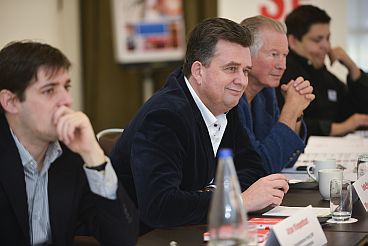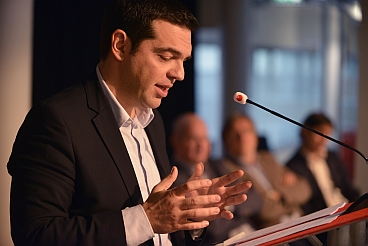Emile Roemer: ‘It’s good that the left in Europe are learning from each other’
Emile Roemer: ‘It’s good that the left in Europe are learning from each other’
‘Parties to the left of social democracy can learn a great deal from each other’s experiences, whether it’s about how to conduct an effective opposition or participate in a coalition government. Knowing what’s going on outside your borders increases the chances of being successful in your own country, now and in the future.’ This was SP leader Emile Roemer’s assessment at the end of a two-day informal conference of representatives of modern left parties from eleven European countries who were meeting in the Netherlands at the invitation of the SP.

Emile Roemer in discussion with Alexis Tsipras
The conference took place in Amersfoort, the town in which the SP now has its headquarters. Participants included party leaders, ministers and former ministers from left parties, who brought each other up to speed on recent political and socio-economic developments in their countries. During two days they took the opportunity to familiarise themselves with each other’s experiences and insights and to learn from these. Every Nordic country was represented along with Germany, Ireland, Greece and Cyprus.
Greek opposition leader Alexis Tsipras also used the opportunity provided by his presence at the conference to address the SP’s public symposium ‘Economy, society and democracy’, held over the road from the conference in the party headquarters. His own party Syriza would, according to polls, come out of elections held now as Greece’s biggest. Tsipras drew a picture of his country as one in which spending cuts imposed by the European Union are affecting everything and everyone, with the exception of the rich, in which unemployment is enormous, poverty degrading and the only prospect of a better tomorrow lies, in the eyes of ever more people, in a radical change of policy under the leadership of Syriza.

Alexis Tsipras during his speech
In other European countries too, the need is felt for a fundamentally different course, a rejection of short-sighted spending cuts and the selloff of the public sector, policies that bring above all mass unemployment and growing social inequality. In a number of countries left parties are attempting, via participation in government, to adjust policy in the direction of less austerity, more investment and protection of the public sector from privatisation and erosion. Until recently left parties were in governing coalitions in Norway, Cyprus and Iceland, and they currently take part in governments in Denmark and Finland. Elsewhere such parties play a leading role in the resistance to their governments’ neoliberal policies, policies initiated by the European Union.
It seems likely that the coming elections for the European Parliament will see left parties emerge stronger, giving them a greater voice in the new EP. The SP hopes to be able to send a strong delegation from the Netherlands, with the probable leading candidate being Dennis de Jong, who currently represents the party in Brussels and Strasbourg. On 22nd February the SP national congress will definitively confirm the final list of candidates.
